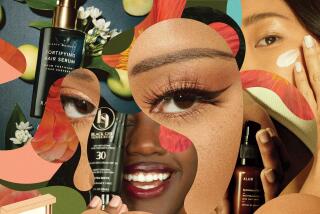Manager Gives Chinese Cosmetics Firm a Winning Make-Over
- Share via
SHANGHAI — Most state-owned enterprises in China are perceived as sinking ships. But not if they have a captain like Ge Wenyao.
For 15 years, Ge has steered China’s largest cosmetics company through the turbulence of market reform, from near shipwreck to a symbol of national pride.
His philosophy is simple: Chinese enterprises don’t have to be failures.
About two-thirds of China’s state-owned companies are losing money, hemorrhaging jobs and becoming liabilities to a nation desperate to make its concept of a socialist market economy work. Foreign companies already have their foot in the door, and China’s expected entry into the World Trade Organization will only make competition more fierce.
But how Ge has successfully led the state-run Jahwa cosmetics concern by instituting such bedrock market-driven initiatives as reliable customer service and capital investment could serve as a wake-up call to overseas investors who may have underestimated Chinese companies’ tenacity for competing on their home turf.
“In every Chinese industry we’ve looked at, there are two or three companies that have reinvented themselves quite substantially to show they are not a pushover for foreign companies,” said Paul Woodward, a marketing specialist with Business Strategies Group, a research firm based in Hong Kong.
“But they are dependent almost entirely on the quality of their senior executives--who are willing to make the change and break away from the bureaucratic background most of them come from.”
At 52, Ge is the same age as Communist China and the fate of the tall, soft-spoken man with large spectacles has risen and fallen with that of his motherland.
Ge, whose father was an architect, excelled in his studies and in basketball, and earned a scholarship to study in France in 1966. But the Cultural Revolution dashed that dream and prevented him from going. He and a generation of youth were shipped off to the countryside to “fix the earth.” There he saw poverty and hardship unimaginable in his native Shanghai. A fire in his belly began to burn for change.
At age 29, he was sent back to Shanghai. But like most returnees, he was without useful skills or proper education. The only jobs he could find were temporary--collecting garbage and utility bills, apprenticing at a match factory.
Eventually, he finished night school and earned the equivalent of a business degree. Jahwa, which means family chemicals, hired him. With so few qualified candidates, Ge quickly moved up from planning department deputy to general manager.
“He has enormous personal charisma and a strong sense of mission,” said Xia Dawei, head of the Shanghai National Accounting Institute, who was once Ge’s teacher. “His staff members follow him because they are confident he won’t lead them astray.”
When Ge became boss in 1985, Jahwa was a shambles.
“The mayor brought a group of foreign dignitaries to visit and he was appalled,” said Ge, recalling the time when broken windows, bottles and debris from shoddy construction littered the factory grounds, damaging morale and productivity. “I told him I would turn things around. But I had been on the job only seven days.”
Today, that embarrassing old factory building has been replaced by a skyscraper overlooking Shanghai’s fabled waterfront.
The cosmetics industry was one of the crown jewels of old Shanghai. Jahwa’s pre-Communist incarnation, Kwong Sang Hong Ltd., is considered here to be China’s first home-grown cosmetics company, formed 102 years ago to give foreign companies a run for their money.
When Europeans first brought their perfumes and powders to the Middle Kingdom by the shipload, China had no domestic personal-care industry to speak of.
But domestic cosmetics makers came of age in the 1930s. Even in cosmopolitan Shanghai, where foreign goods were must-have status symbols, companies like Kwong Sang Hong made impressive inroads. They seized on the country’s growing nationalism and offered their countrymen a quality alternative at a lower price.
But the golden age of Chinese cosmetics ended with the Communist takeover in 1949. Hundreds of products were reduced to a few cold creams deemed appropriate for the working class.
During the extreme political radicalism of the 1970s, the make-up company was transformed into a hardware factory.
The 1980s saw a renaissance in personal-care products. After decades of neglecting their skin and hair, Chinese women starving for a make-over snatched up everything on the market. Jahwa’s first makeup sets sold out instantly at a Shanghai department store. Foreign brands were not yet available. Jahwa had a near monopoly.
But competition intensified in the early ‘90s. Multinationals such as Procter & Gamble and Unilever and popular brands such as L’Oreal and Maybelline gobbled up market share and put smaller Chinese companies in dire straits. Those that could went the way of joint ventures. Even part of Jahwa was spun off to team up with an American company, hoping to soak up marketing and management expertise.
“We learned a lot in those days,’ said Ge. “Sales and marketing from the Americans, artistry and style from the French, and quality control from the Japanese.”
But two years into his new job, Ge felt that the best managers and top-performing brands he had brought into the partnership were being ignored.
So, despite high debt and poor management and marketing know-how, Ge shocked the business community in 1992 by going back to what was left of the original Jahwa.
“I just don’t believe Chinese companies can’t make it on our own.” Ge said in an interview.
The first thing he did was buy back the lifeline of the company: two popular skin-care and hair-product lines called Maxam and Ruby.
Then Ge instituted market-driven reforms, which at the time were groundbreaking moves for a state-owned company. He overhauled management, added marketing, research and development departments, invested in new technology and set up customer service hotlines.
“Companies like Jahwa are great role models,” said Miranda Shu, an associate at the Shanghai office of McKinsey & Co., a management consulting firm that has helped many Chinese companies with corporate restructuring. “Most state-owned companies have no marketing capabilities.”
Today, some 3,000 domestic companies are jostling with multinationals for the right to sell lipstick and face cream in China. The market is maturing, but there is still plenty of room to grow, experts say. Sales last year were $3.2 billion. By 2010, it’s expected to hit $10 billion.
Jahwa’s market share, about 5%, is a distant second to multinational giant P&G;, which has about 20%.
Jahwa is not the most successful Chinese company. Consumer appliance makers like Haier and computer company Legend have higher profiles. But those firms are relative newcomers, started in the 1980s. They are not state-owned enterprises and do not carry the same baggage.
“Strategically, there is no difference between us and them,” said Ge. “We are still run by the government. Whether I stay or go is up to the will from above.”
Ge has overseen Jahwa’s expansion into high-end perfumes, herbal hair and skin-care products and hipper makeup lines. It is also bidding to take over some less-efficient rivals. The American joint venture that Ge once worked for, Shanghai Johnson, is now a Jahwa subsidiary. That is a source of great pride for the company.
Last month, Jahwa became the first domestic cosmetics firm to be listed on the Shanghai stock exchange.
“If they could clone a thousand Ge Wenyao’s, China would be much better off,” said Zhao Xinshan, a Shanghai writer.
“The majority of Chinese bureaucrats just take from the company, plunder its resources and feel nothing,” he said. “Ge is not like that. He connects the fate of the company to his own life. His life is Jahwa. Jahwa is his life.”
More to Read
Inside the business of entertainment
The Wide Shot brings you news, analysis and insights on everything from streaming wars to production — and what it all means for the future.
You may occasionally receive promotional content from the Los Angeles Times.










